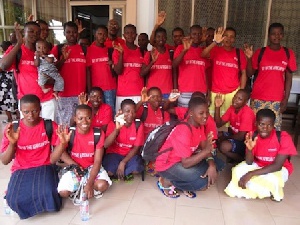- Home - News
- TWI News | TV
- Polls
- Year In Review
- News Archive
- Crime & Punishment
- Politics
- Regional
- Editorial
- Health
- Ghanaians Abroad
- Tabloid
- Africa
- Religion
- Election 2020
- Coronavirus
- News Videos | TV
- Photo Archives
- News Headlines
- Press Release
General News of Wednesday, 12 November 2014
Source: The Finder
Marriage by abduction booms; 150 girls in Upper West
Human rights activists and social workers have expressed concern about the practice where young girls are abducted and taken as wives.
The practice, which has been in existence for a long time, involved the forceful abduction of a girl by a group of young men, and in some cases raped by the man who wants to marry her.
The man could either be known to the victim or someone she knows, or could be a total stranger.
The mode of abduction includes physical arrest, use of charm, and use of concoctions.
Both abduction and rape are criminal offences under Ghanaian law.
In many cases of abduction, the girls are often accosted on their way to or from school, farm, market or funeral, or at Pito drinking spots.
From 2009 to date, ActionAid Ghana, a development non-governmental organisation (NGO), has rescued 150 girls from such abductions and marriage cases in 57 communities in the Upper West Region.
The districts are Lambussie-Karni, Jirapa and Sissala East, all in the Upper West Region.
Upper West Programme Manager of ActionAid Ghana, Mr George Dery told The Finder that young girls of school-going age between 14 and 16 years are forced into marriage without their consent.
This, he said, denies many girls the opportunity to be educated, thereby exacerbating poverty levels in rural communities in the region.
He explained that in some instances, the girl’s parents consent to the abduction without the girls’ knowledge.
However, he said, in other cases, parents were not aware and did not condone the marriage but were unable to resist for fear that the communities from where the abductors come from would take offence and therefore retaliate when young men from the abducted girl’s community also abduct girls from other communities, as the practice mandates.
Factors influencing marriage by abduction
Mr Dery explained that due to the high level of poverty, some parents accept money from well-to-do men with the intention of giving their daughters to the men without their consent and that such parents often arrange for the abduction of their daughters.
He stated that in rural areas there is often pressure on young girls to marry early and therefore where a girl stays in her father’s house beyond a certain age, it becomes a source of worry.
This puts pressure on the family, who do all in their power, including abduction, to get a suitor to marry her off.
What happens after the abduction
Mr Dery said after the abduction, elders from the man's village then ask the family of the girl to agree to the marriage by initially presenting cola, drink, fowl or tobacco, depending on the tradition of the community where the girl comes from.
When the gifts are accepted, the man is then given time to pay the dowry.
He explained that in Sissala communities, when a girl is abducted she is handed over to the mother of the man or an elderly woman and it is only after the dowry has been paid that the man can have sexual intercourse with the woman.
On the other hand, Mr Dery said, Dagaaba communities men have sexual intercourse with the girls the moment the girl is captured.
In this case, the family of the girl often consents to marriage because a girl who has lost her virginity would be socially unacceptable for marriage to another man.
Sometimes the abductor keeps the girl in a hiding place until she is pregnant, at which time the family again feels it has no option but to agree to the marriage.
How ActionAid rescues the girls
Mr Dery said ActionAid has formed Community Based Anti-Violence Teams (COMBAT) trained in domestic violence and crime reporting procedures.
He noted that COMBAT collaborates with the Domestic Violence and Victims Support Unit (DOVVSU) of the Ghana Police Service to bring peace and sanity to rural communities.
Effects of marriage by abduction
Marriage by abduction truncates the education of girls, leading to high school dropout and high illiteracy levels among girls.
Most of the girls abducted for marriage never have the opportunity to attend school again.
Such girls become less empowered, and this phenomenon only contributes to deepening the poverty levels of their families.
Abduction leads to increased social problems like domestic violence, unwanted pregnancies and complication during delivery, divorce and unhappy marriages. The overall effect is that it perpetuates the poverty cycle.
Mr Dery said majority of parents of the girls were unaware that this traditional practice violates the rights of girls and is also illegal.
He explained that as a result, ActionAid Ghana facilitated community-level discussions led by COMBAT to raise awareness, focusing on these two critical aspects in 57 communities in 2012/2013.
ActionAid Ghana, with the support of COMBAT, is tracking and monitoring the progress of rescued girls with the view to ensuring that they stay in school and complete senior high school.
In 2009 and 2013, ActionAid, through COMBAT, was able to rescue a total of 108 abducted girls.
Three of these girls are now in senior high school, one in a technical institute while the rest are back in junior high school (JHS).











